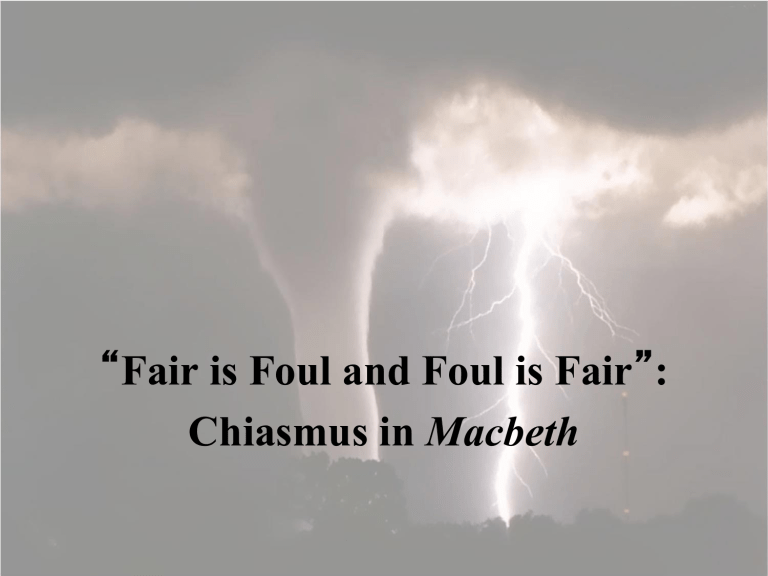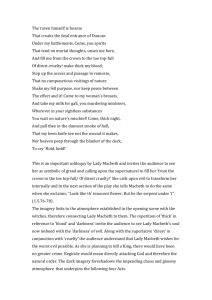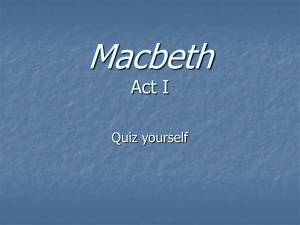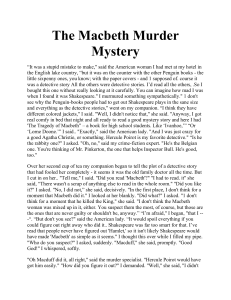Chiasmus in Macbeth PP

“ Fair is Foul and Foul is Fair ” :
Chiasmus in Macbeth
Chiasmus is a parallel created by inverting the grammatical structure of the second clause of a sentence:
Ask not what your country can do for you
, but what you can do for your country
Chiasmus is a parallel created by inverting the grammatical structure of the second clause of a sentence:
It ’ s not the men in my life,
It ’ s the life in my men.
The witches ’ common use of this linguistic structure (among others) conveys their moral ambiguity.
“ Fair is foul and foul is fair ”
More importantly, though, this structure also appears as Macbeth and Lady Macbeth move in opposite directions in regards to their mental strength, moral sensitivity, and masculinity.
Macbeth starts the play doubtful, sensitive, and easily manipulated by Lady Macbeth. She starts evil, almost terrifying, and certainly powerful.
Lady Macbeth
Macbeth
By the end, however, it is Macbeth who is powerful and evil, and Lady Macbeth who has gained moral sensitivity, but lost all strength, and indeed, sanity.
Macbeth ’ s progression:
1.2: “ For brave Macbeth-well he deserves that name-- . . . unseam'd him from the nave to th ’ chops, / And fix'd his head upon our battlements.
”
1.3: “ My thought, whose murder yet is but fantastical, / Shakes so my single state of man that function / Is smother'd in surmise.
”
State of Mind:
Brave, bloody, a little unstable
Tempted, but horrified at even considering it
1.7 “ …we but teach /
Bloody instructions, which, being taught, return / To plague th ’ inventor.
”
By the end of the scene…
“ I am settled, and bend up / Each corporal agent to this terrible feat.
”
State of Mind:
Rallying his decency and logic
Has to force himself to do the murder
[Murder #1: Duncan]
2.2 “ I have done the deed. Didst thou not hear a noise?
”
State of Mind:
Confused, paranoid, a little unhinged
3.2 “ O, full of scorpions is my mind, dear wife!
”
3.4 “ Now I am cabin'd, cribb'd, confined, bound in / To saucy doubts and fears.
”
“ I am in blood / Stepp'd in so far that, should I wade no more, /
Returning were as tedious as go o'er: ”
State of Mind:
Tormented, conscious of his evil
Tormented, paranoid
[Sees ghost]
Weary of evil, but resolute and grim
[Murder # 3:
MacDuff ’ s family]
5.3 “ let them fly all. . .
The mind I sway by and the heart I bear / Shall never sag with doubt nor shake with fear.
”
5.5 “ To-morrow, and to-morrow, and tomorrow, / Creeps in this petty pace from day to day / To the last syllable of recorded time.
”
State of Mind:
Resolute, fearless
[Lady Macbeth commits suicide]
Despairing, but not losing focus
5.5 “ Blow, wind! come, wrack! / At least we'll die with harness on our back.
”
5.7 “ They have tied me to a stake; I cannot fly, /
But, bear-like, I must fight the course.
”
5.8 “ Lay on, Macduff, /
And damn'd be him that first cries, 'Hold, enough!
’”
State of Mind:
Brash, beyond caring
Captive, still brash
[Macbeth kills many]
Not willing to give up, even when he knows it ’ s hopeless.
[Macbeth dies]
On your own, find 6 quotes that show Lady
Macbeth ’ s progression, and how it contrasts with her husband ’ s.
Arrange them in your comp book in a doubleentry journal. The left side will include the quote and the right must include your commentary.
Your insights should focus on Lady Macbeth ’ s progression as a character and what that lends to our understanding of her motivations.











